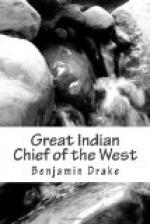“MESSRS. EDITORS—Hearing of the death of the celebrated Sauk chieftain, BLACK HAWK, I am induced to make you the following communication, which may be interesting to some of your readers.
“During a residence of several years in what is now the Territory of Iowa, I had many opportunities of seeing and conversing with this noted warrior, and often look back with feelings of great pleasure to the many tokens of good will and friendship that he has frequently bestowed upon me. His lodge was always open to a stranger, and he was ever ready to share that with him which he might most want, either his furs and blankets for a couch, or his corn and venison for a repast. He always spoke in terms of high regard of the whites, saying, that in war he fought like a brave man, but in peace he wished to forget that his hand had ever been raised against them. His career as a warrior commenced at a very early age; when he was but fourteen years old, his father, Pawheese, led a war party against the Osages, in which expedition he accompanied him. They succeeded in reaching the village of Osages, which they attacked, and after a very severe encounter, they routed their enemies and burnt their town. In this battle Black Hawk’s father was killed, but he revenged his death by killing and scalping the Osage who had slain him. He was fond of recounting his earlier exploits, and often boasted of his being at the right hand of Tecumthe, when the latter was killed at the battle of the Thames. His account of the death of this distinguished warrior, was related to me by himself, during an evening that I spent in his lodge some winters ago. In the course of our talk, I asked him if he was with Tecumthe when he was killed. He replied—
“’I was, and I will now tell you all about it.—Tecumthe, Shaubinne, and Caldwell, two Potawattimie chiefs, and myself, were seated on a log near our camp fire, filling our pipes for a smoke, on the morning of the battle, when word came from the British general, that he wished to speak with Tecumthe. He went immediately, and after staying some time rejoined us, taking his seat without saying a word, when Caldwell, who was one of his favorites, observed to him, ’my father, what are we to do? Shall we fight the Americans?’ ‘Yes, my son,’ replied Tecumthe, ’We shall go into their very smoke—but you are now wanted by the General. Go, my son, I never expect to see you again.’ Shortly after this, (continued Black Hawk,) the Indian spies came in, and gave word of the near approach of the Americans. Tecumthe immediately posted his men in the edge of a swamp, which flanked the British line, placing himself at their head. I was a little to his right, with a small party of Sauks. It was not long before the Americans made their appearance; they did not perceive us at first, hid as we were by the undergrowth, but we soon let them know where we were by pouring in one or two volleys as they were forming into a




